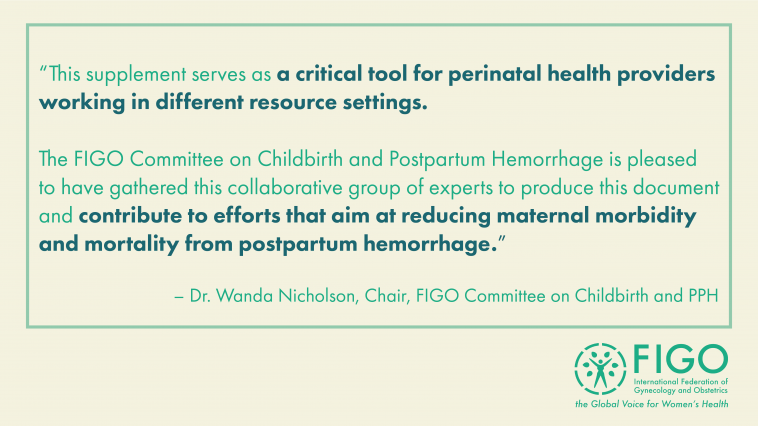New IJGO Supplement: FIGO recommendations on the management of postpartum haemorrhage, 2022

FIGO’s Committee on Childbirth and Postpartum Haemorrhage (formerly Safe Motherhood and Newborn Health), in collaboration with global experts, has published a new supplement in the 157(S1) issue of the International Journal of Gynecology and Obstetrics (IJGO) on 17 March 2022. The supplement provides a comprehensive review and best practices for the prevention and management of postpartum haemorrhage (PPH).
This document represents a critical review of the literature and insights from global experts on the daily approach to prevention and treatment of PPH. This work will help to save the lives of mothers, ensure safer childbirth and promote the family unit globally.
– Professor Anwar Nassar, American University in Beirut, Lebanon
Read the Postpartum Haemorrhage Supplement
PPH is the leading cause of maternal mortality in low-income countries, and accounts for over 25% of all maternal deaths worldwide. Most deaths could be avoided using timely and appropriate interventions administered by trained personnel utilising best clinical practices.
The purpose of the supplement is to provide an update on key concepts in the management of PPH and specific tools to health care workers in low- and middle-income countries (LMICs) to facilitate evidence-based treatments for the reduction of maternal morbidity and mortality. The supplement provides guidance across the breadth of perinatal health care providers, including obstetricians, gynaecologists, midwives, nurses and general practitioners.
Efforts to reduce maternal morbidity and mortality from postpartum haemorrhage demand the use of sustainable prevention strategies and evidence-based treatments.
– Dr. Maria Fernanda Escobar, Universidad Icesi, Cali, Colombia
FIGO’s key recommendations in this supplement include the following:
- The use of uterotonics for prevention of PPH during the third stage of labour is recommended for all births. Oxytocin (IV or IM) is recommended for the prevention of PPH for vaginal delivery and caesarean section;
- If skilled birth attendants are not present to administer injectable uterotonics and oxytocin is unavailable, administration of misoprostol by community healthcare workers and lay health workers is recommended;
- Care bundles have been associated with improved patient outcomes when adherence is high;
- Early use of intravenous tranexamic acid at PPH diagnosis and within three hours of birth in addition to standard care is recommended for women with clinically diagnosed PPH following vaginal birth or caesarean delivery;
- If women do not respond to treatment using uterotonics, or if uterotonics are unavailable, the use of uterine balloon tamponade is recommended;
- FIGO recommends that all national societies work in collaboration with nurses and midwives to lobby with their respective regional and national organisations to promote and implement these recommendations.
This supplement serves as a critical tool for perinatal health providers working in different resource settings. The FIGO Committee on Childbirth and Postpartum Haemorrhage is pleased to have gathered this collaborative group of experts to produce this document and contribute to efforts that aim at reducing maternal morbidity and mortality from postpartum haemorrhage.
– Dr. Wanda Nicholson, Chair, Committee on Childbirth and Postpartum Haemorrhage